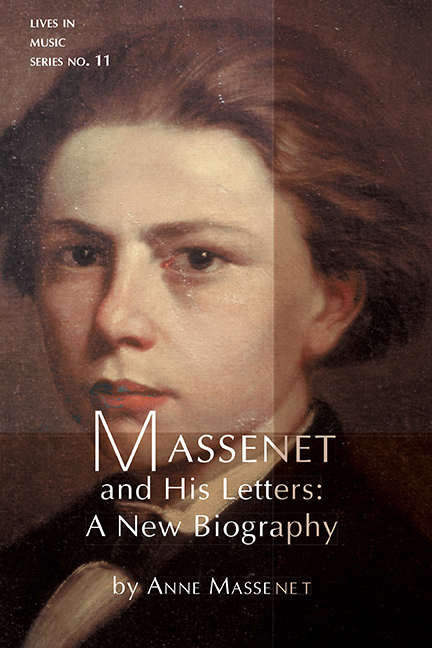Book contents
- Frontmatter
- Contents
- List of Illustrations
- Simplified Genealogy of the Massenet Family
- Foreword
- Dedication
- Translator's Preface
- I Years of Apprenticeship and Roman Adventure
- II The Steps of Quai Conti
- III Notebooks and Sketches
- IV Sybil Sanderson—“The Unique”
- V Massenet's Students
- VI Summer Solitude
- VII The Last Years—Posthumia
- VIII Conclusion
- Massenet: Biographical Chronology
- Bibliography
- About the Author
- Translator's Notes
- About the Translator
- General Index
- Index of Massenet's Works Cited
- Index of Letters Cited
II - The Steps of Quai Conti
- Frontmatter
- Contents
- List of Illustrations
- Simplified Genealogy of the Massenet Family
- Foreword
- Dedication
- Translator's Preface
- I Years of Apprenticeship and Roman Adventure
- II The Steps of Quai Conti
- III Notebooks and Sketches
- IV Sybil Sanderson—“The Unique”
- V Massenet's Students
- VI Summer Solitude
- VII The Last Years—Posthumia
- VIII Conclusion
- Massenet: Biographical Chronology
- Bibliography
- About the Author
- Translator's Notes
- About the Translator
- General Index
- Index of Massenet's Works Cited
- Index of Letters Cited
Summary
By 1866, Massenet had returned from Rome, a year earlier than planned. Once in Paris, he began to put the finishing touches on a suitcase full of music. On February 24, his symphonic suite Pompéia,an envoibegun in 1864 during his third year of study, was premiered at Le Casino. This was a café with a resident orchestra under the direction of Joseph Arban, who conducted while singing at the top of his lungs! Pompéia's four movements were “Prélude,” “Hymne d'Eros,” “Chant des funérailles,” and “Bacchanale.” In his favorable review, Charles Bannelier compared the music to that of Berlioz. “We find here that master's sturdy hand and his horror of the commonplace that occasionally results in certain peculiarities, as well as occasional orchestration or pairings of wind instruments which reminds us of, without imitating, the ‘Punic Dances’ in Les Troyens à Carthage. We understand that his aim was not to follow the normal organization of symphonic movements. When he evokes the spirit of ancient Italy, one must not look for standard patterns, predictable use of musical motifs, or expected modulations. This descriptively programmed music, whether grandiose or naive, is occasionally exaggerated but always truthfully expressed.” This article in Revue et Gazette musicaleends by repeating almost word for word the opinion given a short time before in Rome by Franz Liszt, “We were struck by the skillful instrumentation, truly surprising for such a young man who is guided more by his sentiment than by his experience.”
The young musician was self-critical of the music written while in Rome. His Requiem did not satisfy him, nor his symphonic sketches, nor even his string quintet. He was interested in composing operatic music and, sensing his determination, Ambroise Thomas spoke of his student to Adolphe de Leuven, the director of the Opéra-Comique. And thus, Massenet was commissioned to compose La Grand'Tantein collaboration with the librettists Jules Adenis and Charles Granvallet.
In July 1866, two of Massenet's symphonic poems composed in Paris were performed, Le Retour d'une caravane and Une noce flamande.
After his return from Rome, Massenet had continued to communicate with Louise- Constance de Gressy by following the standard rules of etiquette, meaning that he corresponded with her mother, Madame Orry de Sainte-Marie. After returning to Paris several months previously, Madame de Sainte-Marie and her daughter had moved into a house at Saint-Leu, near Montmorency.
- Type
- Chapter
- Information
- Massenet and His LettersA New Biography, pp. 29 - 52Publisher: Boydell & BrewerPrint publication year: 2015



